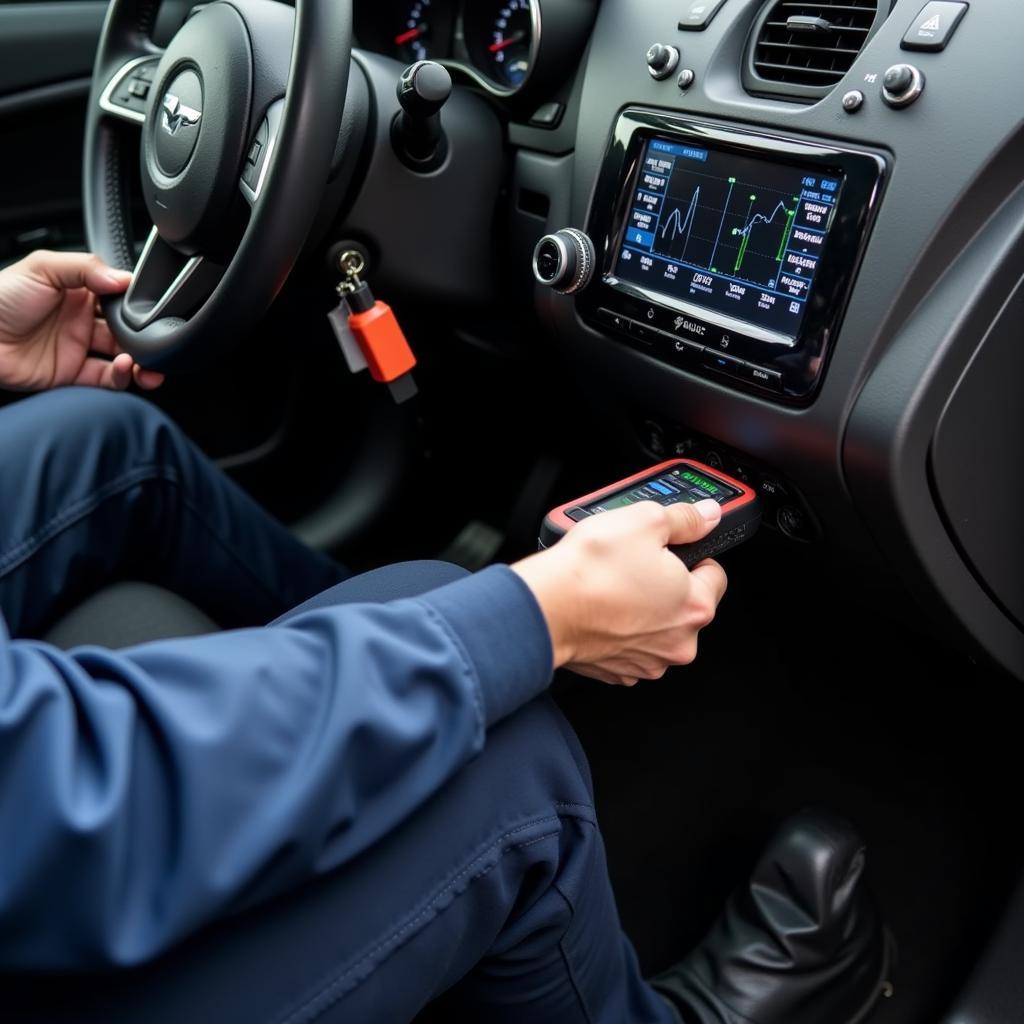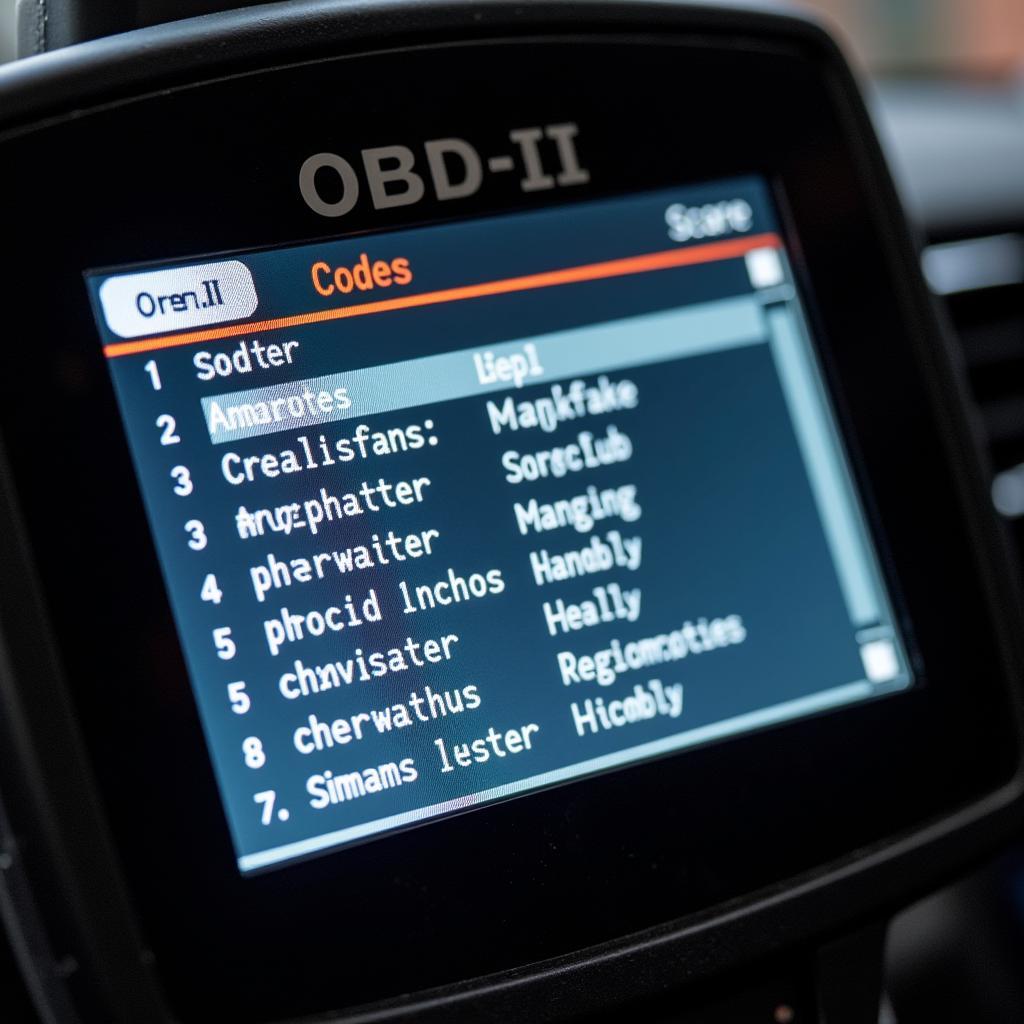Purchasing a Car Diagnostics Kit can seem daunting, especially with the countless options available. Whether you’re a seasoned mechanic or a car enthusiast looking to delve into DIY repairs, understanding your needs and the available technology is crucial. This comprehensive guide will equip you with the knowledge to choose the perfect car diagnostics kit for your needs.
Understanding Car Diagnostics Kits
Before diving into the specifics, let’s clarify what a car diagnostics kit does. In essence, it acts as a bridge between you and your car’s computer system, allowing you to communicate with its electronic control unit (ECU). This communication allows you to read and interpret diagnostic trouble codes (DTCs) that illuminate your dashboard warning lights, providing insight into potential issues.
 Mechanic using a car diagnostics kit to diagnose a vehicle
Mechanic using a car diagnostics kit to diagnose a vehicle
Types of Car Diagnostic Kits
Car diagnostics kits can be broadly classified into a few key types:
1. Code Readers
As the name suggests, code readers primarily read and display DTCs. They are generally the most affordable and user-friendly option, ideal for car owners who want to understand basic engine issues. However, they may not provide in-depth data or advanced functionalities like live sensor readings.
2. OBD-II Scanners
Building upon code readers, OBD-II scanners offer a wider range of features. They can read and clear DTCs, display live data streams from various sensors, and even access manufacturer-specific codes. OBD-II scanners are suitable for DIYers and professionals who need more detailed information for diagnostics and repairs.
 OBD-II scanner displaying diagnostic trouble codes
OBD-II scanner displaying diagnostic trouble codes
3. Professional-Grade Scan Tools
Professional-grade scan tools are the most advanced and comprehensive option, used by experienced mechanics and dealerships. They boast extensive capabilities, including bi-directional control (allowing you to activate specific components for testing), programming functionalities, and access to a vast database of technical information. These tools often come with a hefty price tag but are indispensable for in-depth diagnostics and complex repairs.
Factors to Consider When Choosing a Car Diagnostics Kit
Navigating the world of car diagnostics kits requires careful consideration of your specific needs and budget. Here are key factors to keep in mind:
1. Vehicle Compatibility
Ensure the diagnostics kit you choose is compatible with your vehicle’s make, model, and year. Most modern cars use the OBD-II protocol, but older vehicles may require specific adapters or software.
2. Functionality and Features
Consider the level of detail and functionality you need. Do you only require basic code reading, or do you need live data, bi-directional control, or programming capabilities?
3. User Interface and Ease of Use
Opt for a kit with a user-friendly interface, clear display, and intuitive navigation. Consider whether you prefer a handheld device, a PC-based system, or a smartphone app.
4. Software Updates and Support
Ensure the manufacturer provides regular software updates to maintain compatibility with new vehicle models and functionalities. Reliable customer support and technical assistance are also crucial for troubleshooting any issues.
5. Budget
Car diagnostics kits vary significantly in price, from affordable code readers to high-end professional tools. Determine your budget beforehand and prioritize features that align with your needs and usage.
FAQs about Car Diagnostics Kits
What is the difference between car diagnostics kits and diagnostic kits for cars?
These terms are often used interchangeably. Both refer to tools designed to communicate with a vehicle’s ECU to read and diagnose potential issues.
Can a car diagnostics kit fix my car?
While a car diagnostics kit is an invaluable tool for identifying problems, it cannot directly fix your car. It provides information to help you diagnose the issue, allowing you to perform repairs yourself or consult a qualified mechanic.
Are portable car diagnostic machines as effective as professional tools?
Portable car diagnostic machines can be highly effective for DIYers and enthusiasts, offering a wide range of features at a fraction of the cost of professional-grade tools. However, professional tools offer more advanced functionalities and access to a broader range of data, making them essential for complex repairs and in-depth diagnostics.
Conclusion
Choosing the right car diagnostics kit empowers you to take control of your vehicle’s maintenance and repair. By understanding the different types, features, and factors to consider, you can make an informed decision that aligns with your needs and budget. Whether you’re a DIY enthusiast or a professional mechanic, a quality car diagnostics kit is an indispensable tool for keeping your vehicle running smoothly.

Leave a Reply